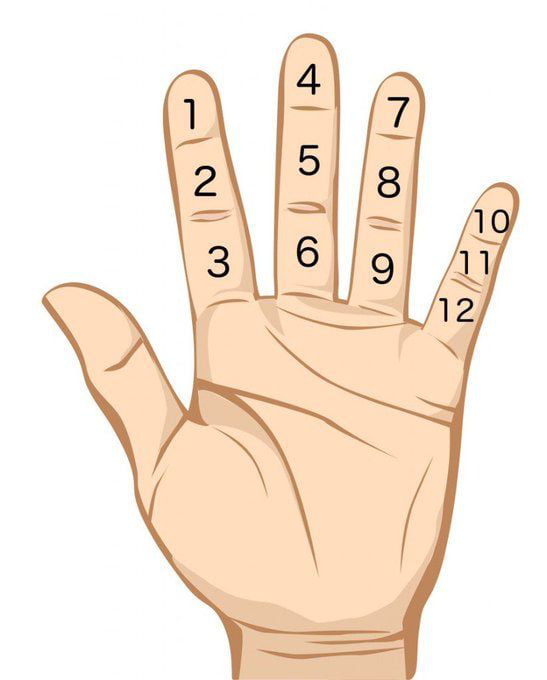Also see this: https://gist.github.com/timvisee/fcda9bbdff88d45cc9061606b4b923ca
It amazingly explains all the insanities for handling dates and times.
6 means 30 is some toilet paper math
If the day started at 1:00 then by the second hour you would be at 2:00, even though only 1 hour has passed. Effectively the day starts at 0. In fact in 24-hour time that is how it’s depicted, 00:00 with midday being depicted as 12:00, so it isn’t confusing
As a programmer I’d rather it start at 0
Yeah but now you can’t enjoy the delights of python
Which is also why I hate that our calendar starts at year 1.
It’s the same logic that was used by ancient astronomers to arrive at 360 degrees for a full revolution.
The math is easier if you have to do it by hand.
You’ve gone 360 on me.

These are called “superior highly composite numbers” apparently https://en.wikipedia.org/wiki/Superior_highly_composite_number
It’s also the one advantage Imperial has over metric. It’s easier to do mental math in a lot of cases in base 12 rather than base 10.
Now excuse me while I bar my windows and doors from the mobs of angry people that show every time I point this out.
True, but why does volume/length/weight have to be separated? I honestly wouldn’t mind a base 12 system if they were connected logically.
I should have been more precise, I was really just talking about length measurements and less so on the holy fuckshit of everything else. I, too, would be super on board with a base 12 measurement system…
If we invent it we can have 3 competing standards!
Let me jump in until the mobs show up. “Noooooo, it’s just what you’re used to lalala. When is dividing by thirds ever useful, anyway?”.
I’ve also found that if you make this point without any reference to metric vs imperial, people tend to accept it.
That’s a good tip. I’ll keep that in mind next time this topic comes up.
Only really counts for feet and inches. But yes, having your base unit be divisible by halves, thirds, quarters, sixths, and twelths with whole numbers of sub units is highly useful when fabricating objects when you don’t have access to modern tooling and supplies. In fact I would argue base 12 is the superior numerical system that was abandoned for metric and we have lost something in the meantime. Though Jan Misali might disagree with his love for sexinal.
Imperial units do have another advantage to this day, though. When talking about machining bolts and threads Imperial use threads per inch or threads per unit length while metric uses the pitch of the thread, so mm in-between threads. This decision means that when machining imperial nuts and bolts we by default pick whole numbers of threads per inch which due to the circular nature of lathes means that a simple clock dial can keep the lead screw synchronised with the head. Since metric uses pitch we pick numbers like 1.25mm pitch which does not always synchronous well with the lead screw and head and requires some odd gear ratios to cut specific threads.
Poor 70. Imagine being the objectively “weird” one out of a hundred.
Well it’s because noon means nine because the day starts at six o’ clock, so three is noon, but we use it to mean twelve which is closer to midday, obviously
Hour hand -> hour = n
Minute hand -> minute = n * 5
It makes sense, there’s just an algorithm attached to each pointer.Hour -> 3 = 3
Minute -> 3 = 3 * 5 = 15The first clocks didn’t have a minute hand though.
Somebody never had a clock with roman numerals and it shows
I remember getting into an argument with a grade school teacher over IIII because most such clocks put that for 4 instead of IV because of some fuckin reason
I despise these so so much. IIII was historically NEVER correct. Some doofus decided to put that on a clock because it looks more symmetrical with the VIII on the other side. Terrible reasoning.
IIII was the way Romans usually wrote 4. It’s associated with simplicity / illiteracy. But also depended on era, region, intended audience, or practicality. I think the most famous example is the coliseum using LIIII.
There’s still variation even now; standardization is relatively new, and it’s not common knowledge. And dates… it’s like every 50-100 years people decided to write them differently.
Weird, I’ve seen many analog clocks with Roman numerals but always IV for 4.
It’s actually called the “clockmakers four” or “watchmakers four.” it’s a thing.
Yeah I looked it up and saw it is a thing, and it’s interesting. I wonder if the clock I’m thinking of was just a really cheap one that was labeled as you’d expect based on Roman numerals or whether some just didn’t follow it.
To be fair, Google searching Roman numerals clocks give you about a 50/50 distribution.
I wasn’t aware of this either and I suspect we’re not alone. It’s not highly noticeable and if there’s a 50-50 chance won’t even see it…
False. I had a clock that used IIII instead.
Your clock having it doesn’t change that mine didn’t.
deleted by creator
Relatively funny but gets worse the more you think about it.
The 6 stands for 6, not 30.
When we have AM and PM it would be dumb to have 1-24.
1 is the end of the 1st hour. 2 the end of the second. This is why it starts at 0.
0
She’s a witch!
The 6 means 30, both of which also mean 1/2
The french:

Goddamn metric time
Even the French figured out that decimalized time was stupid after a couple of years.
Which has added credence to the old saying that “The French follow no one. And no one follows the French.”
I kinda want to try it out lol
Why the ‘IIII’ insted of ‘IV’?
Prevents confusion between the four and the six: III, IV, V, VI, when the watch is not held perfectly vertically for viewing.
Actually very common in watches with roman numbers iirc
i’m pretty sure that IV is a modern typographic thing
I’ve also heard that, because in Latin IV is the beginning of “IVPPITER” (Jupiter), there’s a theory that people avoided using “IV” as to not “disrespect” the god’s name. 🤷♀️
Also, on a 12 hour clock, 3 sets of four, e.g.:
- I, II, III, IIII
- V, VI, VII, VIII
- IX, X, XI, XII
looks clean af I guess.
May as well just go with VIIII then. Or maybe 9.
Since the IIII usage is common in the Middle Ages and even into the Early Modern Period, when nobody believed in Jupiter, that is obviously just something somebody made up.
It could have also started from that and continued on despite people not knowing the reason, no? I do agree that it’s quite silly and unlikely, though.
Why does everything that comes from Switzerland always seem to be owned by Swatch? Do they not have any other brands there?
Now I really want a .beats watch. That’s so retro cool.
If you’re ok with a screwdriver, you can mod a Casio F91-W and add a .beat watchface https://www.sensorwatch.net/docs/watchfaces/clock/#beat-time
Somebody gave me this clock…I just need the time.

I have no issue reading this.
ten ten
piece of art
Clocks should use 24h format. AM/PM is completely useless.
It sounds like a joke but I really had someone stop me on the street to ask for the time and when I said 2:30 they asked “AM or PM?” I guess a 24 hour clock would’ve prevented that.
No it’s not, with a 12h format on an analog watch you can use the sun to find true north. It is also easier to read it when the hands have double the amount of degrees to indicate the number.
Edit – digital watches should use 24h, I fully agree, maybe there was a misunderstanding because it’s analog watches we’re talking about here and these could stay 12h IMHO
How do you find north on a 12h face that wouldn’t work with a 24h face? Because the method I know, requires correcting for the 12h circle.
Yeah, that’s the method I know.
Divide the angle that is made in half
And that’s how you correct for the 12h face.
Thought as much but never had any experience with 24h watches, so no comment on this from my side :)
With a 24h watch, you line up the hour hand with the sun. Because the sun does a full circle in 24h and the hour hand does the same, lining them up will always make 24 point north (on the northern hemisphere).
A compass is still the better option, because the magnetic field also points north in the southern hemisphere and doesn’t have to be recalibrated when you move too far east or west.
I have never seem a 24h wrist watch (I know they exist) aside from extremely seldom as wall clocks
I’ve looked for them, but they’re very hard to find and expensive too. You can’t just slap a 24h face on a 12h mechanism, so it’s all custom and produced in low volumes. (I think it’s technically possible to convert a 12h period into 24h by switching out a single gear, but that might ruin your minute hand too? I’m no clock maker.)
They don’t have to be expensive, though such watches are less popular for everyday use. In fact I’m wearing a Vostok Kommendurski with a 12/24 hour dial. When I was a medic, I needed to record all my times in 24hr format on my run reports. I think I paid $35US delivered from Russia 15 or so years ago.
And no extra gear is needed to make an analog watch/clock indicate 24 hour time. Time doesn’t change. You simple have one scale that reads from 12AM through 12PM and then at the next hour, (1PM) it simply gets renumbered to 13, 14, 15, 16 and so on until you reach 24 on the inside scale. Easy peasey.
But it is possible to build a watch/clock that the movement does move in 24 hour time and you would be correct it would a couple of extra gears to accomplish. But, it would also be a real pain to create a legible watch face with all those numbers on a reasonable sized watch. Far simpler and easier to print the two scales on the face and call it good.
You paid $35 for the watch, the delivery or both? Because I saw those Vostok watches with proper 24h faces, which is exactly what I’m looking for, but they’re $140. I guess that’s not super expensive for a watch, but I can get a much nicer 12h watch for that money.
And a double numbered clock face is the simple solution, probably more convenient to read, but also not really a conversation starter :)
Vostok Komandirskie

How the heck do you find north based on your watch? I’m pretty good at knowing where north in based on where I am.
I live in north Manchester so I know Manchester is south. Or I can look at the sun if not midday and figure it out.
How the heck do you find north based on your watch?
I live in north Manchester so I know Manchester is south
What if you go on a trip to Thailand and get turned around in the jungle?
Or I can look at the sun if not midday and figure it out
That gives you a very approximate direction.
It’s useless in the jungle, as you can’t see the sun.
You don’t need to stare directly into the ball of fire to determine where the Sun is. All you need is the flashes of light through the leaves - and you CAN see that in the jungle.
It’s the same method.
The distance between the sun and 12 is divided by two, because the clock face only shows half the day.
If we had a clock with 24 hours in the circle and used the same method, it’d be the same as pointing at the sun and saying: South is where the sun will be at noon.
Thanks.
I don’t generally go places like that, but if I needed to be aware of north I would take a compass.
Still good information though.

IIRC they counted the bones in their fingers using their thumb and that gives 12. The first sundial was around the equator and there is always light for half a day, so half a day becomes 12 hours.
To count large numbers often one hand was used to count using 5 fingers and the other to count the bones, so you get 5x12 for 60 minutes.
AIUI there was an aspect in the divisibility of the numbers being convenient.
12 is divisible by 2, 3, 4, and 6. 60 is divisible by 2, 3, 4, 5, 6, 10, 12, 15, 20, and 30.
10 is divisible by 2 and 5. 100 is divisible by 2, 4, 5, 10, 20, 25, and 50.
If you want to minimize dealing with fractions, 12 and 60 are far more convenient than 10 and 100.
That’s an interesting thought, but I believe it to simply be a coincidence.
The base 12 counting being based on counting the division of your fingers is historically verified, but if the division aspect was so compelling to them you’d expect it to carry forward into their writing system.
By the time you get cuneiform math though, they actually go back to base 10.
https://images.app.goo.gl/9GR6VEiT7GHYF3KaA
As you can see base 12 is not in the written system, or for written mathematics. It just was convenient for counting on their hands.
They used mixes of base 10/base 12 and base 60.
Base 10 would be used go determine the symbols for a specific “digit” in base 60.
So similar to how our 13 is 1 ten and 3 ones, their 13 was the symbol for 10 then 3 symbols for 1. 13 = 𒌋𒁹𒁹𒁹 But 73 would be written 𒁹 𒌋𒁹𒁹𒁹
Which would be interpreted as 1 sixty and 13 ones, or 60 + 13
I’ma start a revolution where we use duodecimal metric for everything, including time.
That’s how we ended up with 12 months of varying length in a year and it’s a mess.
It’s a problem no matter how you divide the year
That’s why I propose changing the orbit of the earth, too
Not if you divide by 5. It gets you 73 days each.
13 months of 4 weeks + new year’s day (+leap day) actually fits perfectly.
At least our hours are the same length regardless of latitude now, so let’s be grateful for that.
Don’t listen to OP’s bullshit.
They work for big clock. They’re trying to convince you 12 hour clock is useless so they can sell you double the clock.
Wouldn’t you need half the clock if it had twice the numbers?
Look at this guy, only one clock. I keep two analog clocks in each room, the AM 12-11, and PM 12-11. The way it was meant to be.











